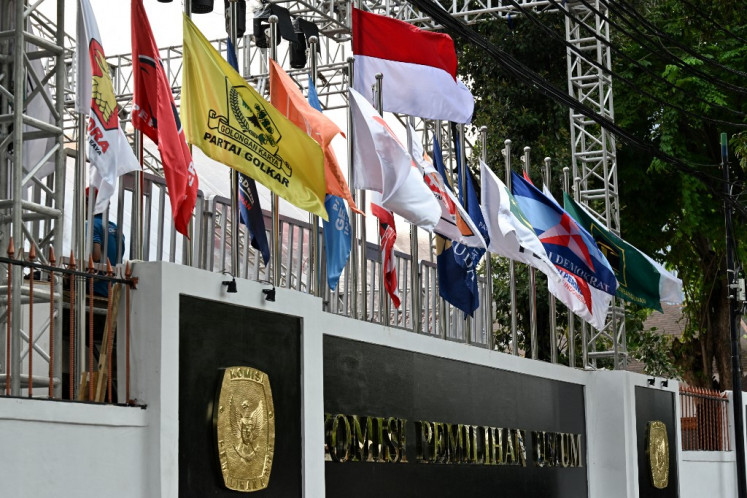Popular Reads
Top Results
Can't find what you're looking for?
View all search resultsPopular Reads
Top Results
Can't find what you're looking for?
View all search resultsAndré Möller: A lover of Indonesian language and lady
Just by chance, André Möller got acquainted with the Indonesian language in 1995, when he first heard it being spoken while in transit for a flight bound for Australia at Ngurah Rai Airport, Denpasar, Bali
Change text size
Gift Premium Articles
to Anyone
J
ust by chance, André Möller got acquainted with the Indonesian language in 1995, when he first heard it being spoken while in transit for a flight bound for Australia at Ngurah Rai Airport, Denpasar, Bali. “At the time, I thought it was impossible for foreigners to learn this language. I myself was sure I wouldn’t be able to speak the language, which I thought sounded weird,” said André in an email interview recently.
After arriving in Australia, the “weird” language and the smiles of Indonesians in Bali resonated in his mind. He became tempted to seek information about Indonesian lessons. The subject known as Bahasa Indonesia turned out to be taught at Lund University near his home in Sweden.
Out of curiosity, he enrolled at Lund University in 1996, majoring in history and anthropology. As a supplementary subject, he chose Indonesian. Later, he planned to visit Indonesia, “as frequently as my pocket allowed,” he said.
In 1998, he enrolled in a private school for foreigners in Yogyakarta for two months. André learned about the forms and functions of Bahasa Indonesia, which he claimed had previously made him very confused.
In the following year, he received a scholarship from the Indonesian Embassy in Stockholm to study in Yogyakarta for a year at the Indonesian department of Yogyakarta State University. The study assignment was eventually extended to three years.
André was nurturing not only his love of the Indonesian language, but his love for an Indonesian native speaker. A Javanese lady named Firdani captivated him and when he returned to Sweden in 2002, André married Firdani.
To a Swede like André, who is well versed in European languages, he found every feature of the Indonesian language unique and interesting. He often found himself puzzled while practicing everyday Indonesian, finding it hard to grasp, for instance, the passive form of Bahasa Indonesia and coming across words that sounded almost alike.
Now, a very fluent Indonesian speaker and writer, André frequently contributes articles to the Bahasa section of Kompas, in a lively style. However, he doesn’t claim to be an expert in Indonesian.
“I’m just fond of every once in a while, reflecting on this language I love,” said the author of Ramadan di Jawa: Pandangan dari Luar, published by NALAR Jakarta as a translation of his doctorate thesis entitled Ramadan in Java: The Joy and Jihad of Ritual Fasting. He is also compiling a Swedish–Indonesian dictionary.
To André, Bahasa Indonesia is very rich. He, therefore, can’t understand the assumption that Indonesian isn’t quite complete enough to express everything. According to him, it is evident in the standard Indonesian dictionary, Kamus Besar Bahasa Indonesia (KBBI), that Indonesian has very extensive coverage and can always be expanded by regional languages.
In his opinion, regional languages in Indonesia will be unlimited sources. The further they are explored, the more they can offer words and other input beneficial for the growth of Bahasa Indonesia. The enrichment with regional languages should of course be done in a fairly refined way and derived from all regional tongues rather than just Javanese.
With regards to the growth of Indonesian, this Lund University doctoral recipient indicated the presence of two groups, one that has concern for Bahasa Indonesia and the other who considers this language as behind the times.
The former has never been tired of giving input to make Bahasa Indonesia capable of keeping pace with current developments by translating technical terms and creating new ones, if necessary. To this end, this group has often turned to regional languages as well as external sources like Sanskrit and others.
The latter deems Indonesian outdated and unable to express what “modern” people wish to convey. André described the second group as frequently mixing Indonesian with other languages notably English, despite their apparent lack of English knowledge, even that of standard Indonesian.
“Unfortunately, the second group is far bigger than the first,” regretted André, adding that “As far as I know, they use English only to appear stylish and prestigious while lacking proper mastery of Indonesian, thus degrading Bahasa Indonesia.”
In André’s opinion, the only hope to foster the love of Indonesian in society lies in the hands of primary school teachers, who can cultivate this feeling and concern among children. Meanwhile, the media, particularly TV, should play a more positive role. “Why do commercials often use English rather than Indonesian?” he questioned.
“There’s indeed the law regulating the use of Bahasa Indonesia and other languages in Indonesia, but it’s a pity that this law seems incapable of bringing about change,” said the man who likes photography and mountain climbing.
Applauding his hard work in preparing his bilingual dictionary due to be published in 2013, some circles have dubbed him a “bridge” between Indonesia and Sweden. “I’m happy to hear that.”
“Sweden and Indonesia have maintained good ties, but they should be strengthened. If I have the chance to play a part, I’ll be proud and satisfied,” said André, who was born in Jonstorp, Sweden, on March 26, 1975.










